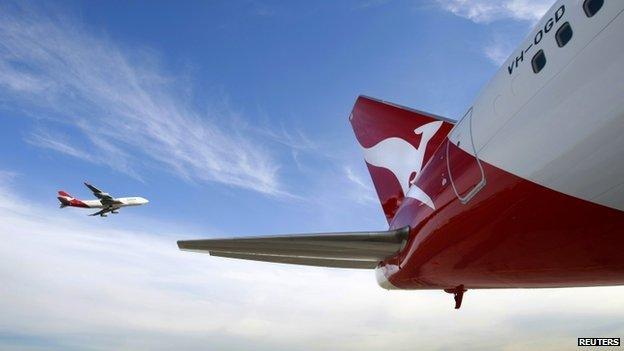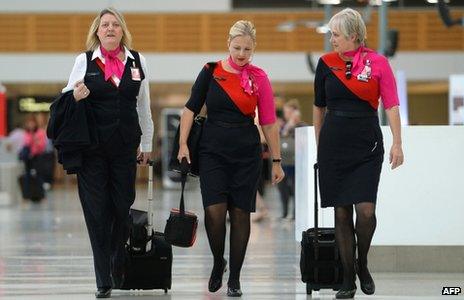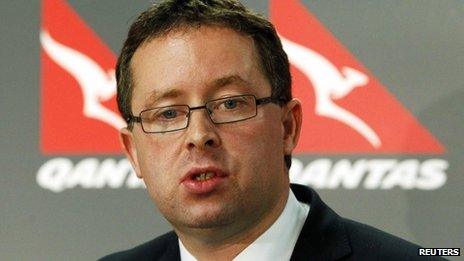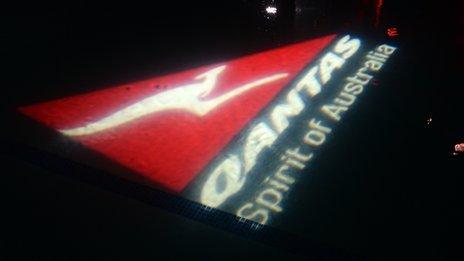Qantas warns of bumpy ride as it cuts budgets
- Published

Qantas's ownership structure has sparked debate among the country's politicians
Australia's Flying Kangaroo is facing the most tempestuous times in its long history.
Battling record fuel costs and unrelenting competition from subsidised rivals, Qantas has just announced 5,000 job cuts alongside an underlying pre-tax loss of 252m Australian dollars (£135m; US$225m) for the second half of 2013.
The cuts are part of the airline's ruthless make-or-break plan to revive its wilting fortunes by reducing costs by A$2bn over the next three years.
"Hard decisions will be necessary to overcome the challenges we face and build a stronger business," chief executive Alan Joyce said in a statement, external.
So can Australia's national carrier turn things around?

The 5,000 job cuts are equivalent to about 15% of Qantas's workforce
Foreign ownership
An airline that began with flimsy planes ferrying passengers in windy open cockpits in the 1920s has been lobbying the government in Canberra to ease limits in foreign investment or provide state intervention to boost its financial health.
While unwilling to pour taxpayers' dollars into the country's ailing car industry, Australian Treasurer Joe Hockey appears sympathetic to Qantas's plea for help.
Ministers are drafting new laws to allow foreigners to buy a majority stake in the airline and to strip away other restrictions.
The Qantas Sale Act, external, brought in under a Labor administration in 1992, prevents overseas interests owning more than 49% of the company. It also blocks any single foreign investor holding more than a quarter of its shares.
Qantas management has argued that the legislation distorts the market and stifles its ability to grow.

Mr Joyce said Qantas was facing some of the toughest conditions it had ever seen
"The government is philosophically attracted to levelling the playing field," said the federal Transport Minister, Warren Truss.
The Labor opposition has insisted that Qantas should be supported by the state, because it would be against the national interest for it to fold.
Rival complaints
Earlier this month, Virgin boss Sir Richard Branson took out a full-page advertisement in Australian newspapers urging Canberra not to give a financial leg-up to its arch-rival.
"Should the Australian taxpayer be forced by the Australian government to prop up the Qantas Group, as federal Treasurer Joe Hockey is suggesting, businesspeople worldwide should think twice about investing in Australia for fear of such intervention in their sectors," Sir Richard wrote in the ad.
"It is not right for the industry and it will not benefit the travelling public or the economy."
Sir Richard's comments were a further escalation in a sky-high dispute.
Qantas claims that it is unfairly hobbled in its fight for customers, because domestic rival Virgin Australia is largely owned by three government-backed operators - Air New Zealand, Etihad and Singapore Airlines.
Even Virgin Australia's usually measured chief executive, John Borghetti, felt the urge to come out swinging, accusing the competition of being underhand.
"This is all about Qantas trying to get a free ride, and there's no doubt about that," he argued on Australian radio.

Soaring fuel costs and rising competition have hurt Qantas
The Flying 'Roo has repeatedly stressed that it does not want handouts, but rather a debt guarantee from the government that would allow it to borrow at more favourable interest rates. The airline is under pressure to tame its finances as ministers consider their next move.
'Megaphone diplomacy'
Media commentators, however, have accused the carrier's executives of leaking information earlier this week about the sweeping job cuts to force Canberra to intervene at a time when unemployment in Australia is creeping higher.
"This is megaphone diplomacy at its worst," said John Durie from The Australian newspaper.
"The obvious intent of this [speculation about job losses] is to get some sort of government assistance, but each time we get one of these headlines, which are deliberately encouraged by Qantas, it just damages the Qantas brand and I think it is ultimately self-destructive."
Chief executive Mr Joyce is due to meet trade unions on Friday to discuss the job losses, but in union circles, there is anger and anxiety.
The national secretary of the Transport Workers' Union, Tony Sheldon, has blamed Qantas's ill-advised foray into neighbouring markets through its budget airline, Jetstar.
"Quite clearly the company has made some very poor strategic decisions about its investment in Asia with its Jetstar operations," he said earlier this week.
'Sentimental' support
Mr Joyce has previously defended Jetstar's operations in Asia, but on Thursday, seemingly admitted to mistakes. "This performance by our airlines is unacceptable and the current position is unsustainable," he said on Thursday, referring to the budget carrier.
He also said Qantas would defer receipt of the three Boeing 787 Dreamliners it had ordered for Jetstar, as well as eight other Airbus A380s it had on order for the group.
Michael McCarthy, chief strategist for CMC Markets in Australia, says these are critical times for the famous old company.
"It certainly has sentimental support, but those of us who are involved in markets tend to think it must sink or swim on its own merit," he said.
In 1921, the Qantas fleet consisted of two humble biplanes. It has grown to become a treasured part of the Australian story, connecting not only distant parts of this vast island, but also providing a gateway to places far beyond.
A country now waits to see what sort of drama the next chapter of this turbulent story will bring.